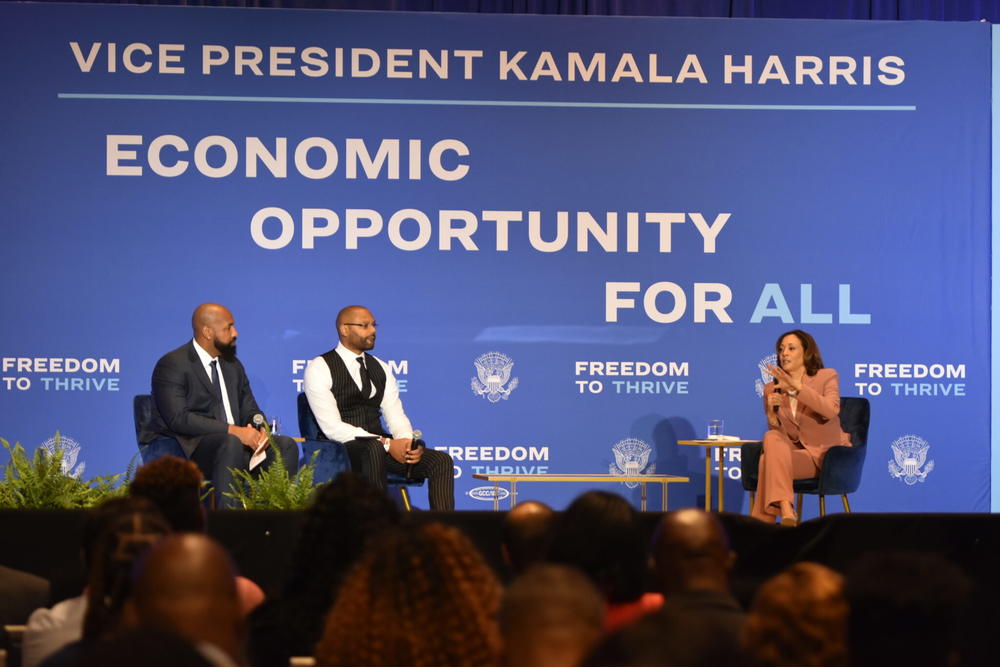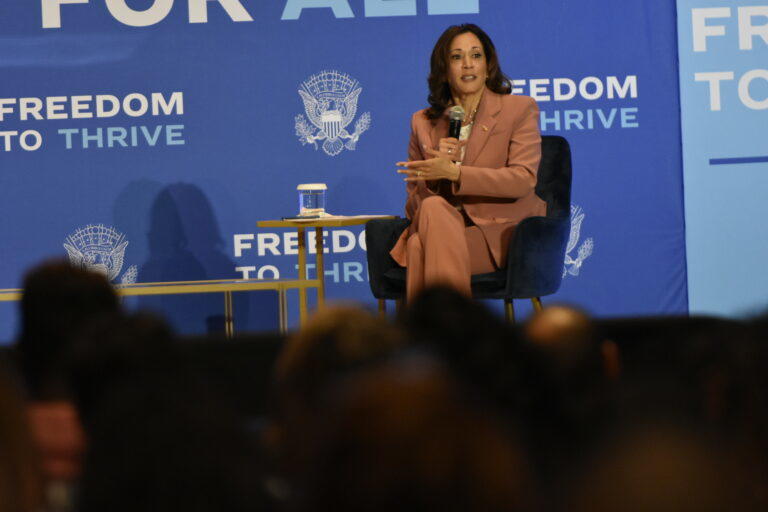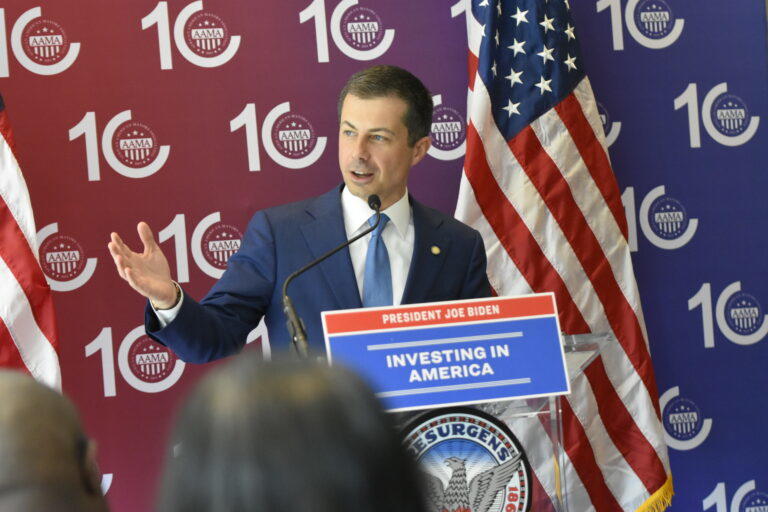
Caption
Vice President Kamala Harris speaks with Earn Your Leisure’s Rashad Bilal and Troy Millings in Atlanta.
Credit: Ross Williams/Georgia Recorder

Vice President Kamala Harris speaks with Earn Your Leisure’s Rashad Bilal and Troy Millings in Atlanta.
Vice President Kamala Harris came to Georgia Monday to kick off a nationwide tour promoting the White House’s record on economic issues and pledge to continue to support small businesses, particularly minority-owned ones.
“None of us have achieved success without support. None of us,” she said during a panel discussion at the Georgia International Convention Center in College Park. “And without someone or people who understood our talent and our dreams and encouraged us to achieve it and showed us how to achieve it. And as much as anything, the spirit behind the push for access to capital, and in particular on this tour, focusing on minority small businesses and Black-owned small businesses and small businesses and entrepreneurs who are Black men, is to recognize the disparities that have existed around the access to the opportunity to achieve success.”
Harris highlighted what the administration calls the fastest creation of Black-owned small businesses in more than 30 years, the lowest Black unemployment rate on record and the lowest gap between Black and white unemployment, as well as increasing the wealth of American families with Black wealth up by 60% relative to before the COVID-19 pandemic.
She spoke about “The Stitch,” a park project in downtown Atlanta intended to reconnect minority communities split by the construction of I-75 and I-85 in the 1950s and 60s.
“During the late 50s and 60s, there was this whole policy push, national policy push, that was called urban renewal,” she said. “It was supposed to be about making life easier for people that lived in the areas where it happened, but essentially, it was about a policy that was directed at making it, many people would say, easier for folks who had wealth and means to move to the suburbs and still have access to downtown.”

Vice President Kamala Harris
Atlanta’s Stitch received a $158 million dollar grant from the Department of Transportation’s $3.3 billion Reconnecting Communities and Neighborhoods Program, meant to fund projects around the country that aim to resolve harm done to minority groups through discriminatory transportation policy.
“So what we have been doing through our infrastructure bill is putting resources into basically reconnecting communities,” Harris said.
Harris’ visit marks her third of the year and 12th since being sworn in.
“With all of your visits, I’m beginning to think that you might want to call Atlanta home,” joked Congresswoman Nikema Williams, an Atlanta Democrat.
President Joe Biden himself is set to visit vote-rich Atlanta May 19 to deliver the commencement address at Morehouse College. Just last week, numerous high-ranking officials came to Atlanta, including Homeland Security Secretary Alejandro Mayorkas, Transportation Secretary Pete Buttigieg and acting Labor Secretary Julie Su, to speak in front of important constituencies.
Speaking at a summit of Black mayors from around the nation, Buttigieg welcomed mayors to describe projects in their cities funded by the Reconnecting Communities and Neighborhoods Program and shot back at allegations it was a political operation.

Transportation Secretary Pete Buttigieg.
“It brings people closer to grocery stores and doctor’s offices,” he said. “It reduces the pollution that kids breathe. And it brings economic development back to neighborhoods. Now, I know that some have tried to turn what I would consider to be a common sense program into another front in some kind of culture war. They would call this woke. I would call this good transportation policy. Because it gets people to where they need to be. There is nothing divisive about healing what is broken.”
In a keynote address at the International Brotherhood of Electrical Workers Local 613 in Atlanta, Su talked up the administration’s $2 billion infrastructure plan, and said the Department of Labor is working to make sure those projects create good union jobs available to minority workers.
“It’s important to say that transportation and good jobs have not always been good for communities of color,” she said. “They’ve not always been accessible for communities of color. And we are saying not this time, not on our watch.”
Speaking to the Recorder after delivering remarks Su said all the visits from administration leaders show how much the president cares about what happens in Georgia.
“The Biden-Harris administration is invested in Atlanta,” she said. “We care what’s happening here. We care what’s happening in Georgia. We want there to be strong infrastructure, and we want there to be good jobs all across this community.”
The administration also likely cares about winning Georgia votes. Biden won the state by nearly 12,000 votes in 2020, and Republican nominee and former President Donald Trump is eager to move it back into the GOP column.

Acting Labor Secretary Julie Su.
With fewer than 190 days left until the election, the latest Real Clear Politics polling average gives Trump a 4% lead in Georgia, 49.2% to 45.2% in a two-way race. When third party candidates are added, Trump’s lead grows to 6.3%.
Conservatives say the Biden administration’s policies have failed to spur economic growth and regular Georgians are still struggling to pay higher prices for groceries and many other goods.
“If Vice President Harris was serious about economic opportunity, she’d stop boosting ‘Bidenomics’ and instead focus on expanding the freedoms that foster economic opportunity,” said Tony West, state director of the Georgia chapter of the conservative Americans for Progress. “But the wasteful spending, heavy-handed regulation, and one-side energy agenda that make up the core planks of ‘Bidenomics’ are diametrically opposed to creating opportunities for Georgians.
“We need more freedom, and less ‘Bidenomics’ if we are going to be serious about unleashing economic opportunity or reigniting the American Dream.”
Harris’ tour is set to continue next week in Detroit.
This story comes to GPB through a reporting partnership with Georgia Recorder.